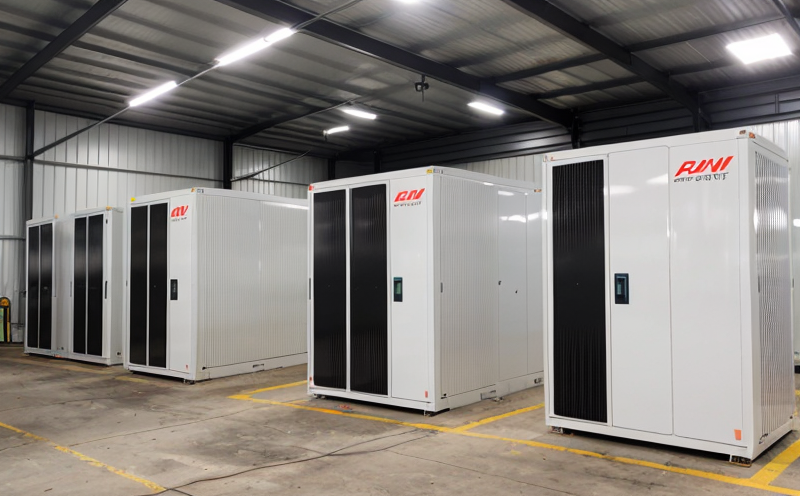SAE J2464 Abuse Testing of Lithium-Ion Battery Systems
The SAE J2464 standard is designed to ensure that lithium-ion battery systems are capable of withstanding various abusive conditions, thereby enhancing safety and reliability. This testing protocol simulates real-world scenarios where a battery might be subjected to extreme temperatures, mechanical impacts, overcharging, or other potential hazards.
The SAE J2464 abuse test is crucial for manufacturers aiming to meet stringent safety requirements set by regulatory bodies such as the National Highway Traffic Safety Administration (NHTSA) and the U.S. Department of Transportation’s Pipeline and Hazardous Materials Safety Administration (PHMSA). By subjecting batteries to these rigorous conditions, manufacturers can verify that their products will perform safely under adverse circumstances.
The test involves several key parameters which are critical for ensuring compliance with SAE J2464:
- Thermal abuse: Exposure to temperatures ranging from -40°C to 85°C.
- Overcharge abuse: Charging beyond the normal charge limit.
- Mechanical abuse: Subjecting the battery to high impact forces and punctures.
- Vibration testing: Ensuring stability during transportation and use in various environments.
These tests are not only about ensuring safety but also about preventing potential hazards that could lead to fires or explosions. For instance, during thermal abuse testing, batteries are placed inside a chamber where they are heated to extremely high temperatures. The test monitors the battery’s response and checks for any signs of failure such as overheating, venting, or flames.
Overcharge abuse tests ensure that even when batteries experience excessive charging, they do not pose a risk. This is particularly important in electric vehicles (EVs) where overcharging can lead to catastrophic failures. Mechanical abuse tests simulate the kind of impacts and punctures that could occur during transportation or use, ensuring that the battery casing provides adequate protection.
Vibration testing is essential for products used in various environments such as aircraft or ships, where constant movement and vibration are common. This test helps manufacturers ensure that their batteries remain stable and functional despite these conditions. By subjecting the battery to controlled vibrations, engineers can identify potential weaknesses or areas of improvement.
The SAE J2464 abuse testing process is a comprehensive approach that not only ensures compliance with international standards but also enhances product safety and reliability. It provides manufacturers with valuable insights into how their products will perform under extreme conditions, enabling them to make necessary adjustments before the product reaches the market.
Compliance with SAE J2464 is mandatory for companies in the energy sector, particularly those involved in the development of lithium-ion batteries. This standard plays a pivotal role in safeguarding public safety and fostering trust among consumers. By adhering to these stringent testing protocols, manufacturers can ensure that their products meet the highest safety standards.
Applied Standards
The SAE J2464 abuse test is based on several key international standards including ISO/IEC, ASTM, and IEC. These standards are widely recognized for their rigorous testing methodologies and are essential in ensuring the safety and reliability of lithium-ion battery systems.
- SAE J2464: This standard specifically addresses the abuse testing of lithium-ion batteries to ensure they can withstand various extreme conditions without failure.
- ISO/IEC 17025: Ensures that laboratories providing calibration and/or testing services are competent to do so. Compliance with this standard is essential for maintaining credibility in the energy sector.
The combination of these standards ensures a robust and reliable testing process, which is crucial for manufacturers aiming to meet regulatory requirements and ensure product safety.
Environmental and Sustainability Contributions
Adhering to the SAE J2464 abuse test not only ensures product safety but also contributes positively to environmental sustainability. By ensuring that lithium-ion batteries can withstand various abusive conditions, manufacturers reduce the risk of accidents or failures in the field. This reduces the need for frequent replacements and extends the lifespan of these batteries.
- Reduced Waste: Batteries that pass SAE J2464 abuse testing are less likely to fail prematurely, reducing the amount of waste generated by discarded batteries.
- Energy Efficiency: By ensuring that batteries can operate safely under extreme conditions, manufacturers contribute to energy efficiency. This is particularly important in electric vehicles where battery performance directly impacts fuel economy and emissions.
The SAE J2464 abuse test also plays a role in promoting the circular economy by encouraging the reuse and recycling of batteries. By ensuring that batteries are safe and reliable, manufacturers can extend their lifecycle, reducing the demand for new resources and minimizing environmental impact.
Competitive Advantage and Market Impact
- Innovation: Compliance with SAE J2464 abuse testing allows companies to innovate in battery design and technology. By meeting these stringent standards, manufacturers can differentiate themselves in the market by offering safer and more reliable products.
- Regulatory Compliance: Adhering to international standards like SAE J2464 ensures that manufacturers are compliant with various regulations, reducing the risk of legal challenges. This fosters a positive reputation and enhances trust among customers.
The SAE J2464 abuse test provides significant competitive advantages by ensuring product safety and reliability. In an increasingly regulated environment, compliance with international standards is not just a requirement but a strategic move that can set companies apart in the market. By demonstrating commitment to safety and sustainability, manufacturers can build strong relationships with customers and stakeholders.





